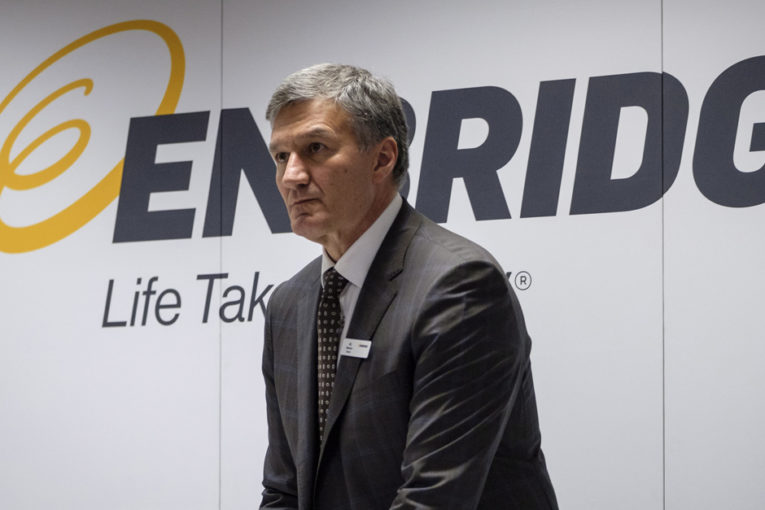
CALGARY — Enbridge Inc. continues to sell off assets in an attempt to deleverage with a $4.3-billion deal announced Wednesday, which will help the company focus on long-haul pipelines, according to analysts.
Enbridge, the largest pipeline company on the continent by marketcap, announced Wednesday it would sell its Canadian natural gas gathering pipelines and processing facilities to Toronto-based Brookfield Infrastructure Partners LP and its institutional partners for $4.3 billion.
The sale includes 3,550 kilometres of gathering pipelines and 19 natural gas processing plants, which analysts say had once been considered core but are now being divested to help the company reduce its debt.
Wednesday’s deal is the Calgary-based company’s third asset sale in the last two months and saw Enbridge shares end the day just under 1 per cent higher on the Toronto Stock Exchange to $46.84 each.
“With a total of roughly $7.5 billion in asset monetizations announced in 2018, we have more than doubled our initial target of $3 billion,” Enbridge president and CEO Al Monaco said in a release. The transaction involving the sale of provincially regulated facilities is set to close in 2018, while the transaction involving federally regulated facilities is expected to close by mid-2019.
Monaco said the deal “also demonstrates our focus on prudent capital allocation and ensuring the continued strength of our balance sheet and funding flexibility.”
Enbridge’s balance sheet has been a key focus for analysts since its blockbuster $37-billion merger with Houston-based Spectra Energy Corp. in 2016.
The pipeline giant’s total long-term debt is $61.2 billion, and it plans to spend another $22 billion on growth projects, such as the $9-billion Line 3 replacement over the next couple of years. The company received regulatory approvals in Minnesota to begin construction on that project last week.
Enbridge has been selling off assets and dividing the proceeds to both pay down debt and fund its growth portfolio, Canaccord Genuity analyst David Galison said.
“From a leverage standpoint, it should help out,” he said.
In May, Enbridge announced the sale of 49 per cent of its renewable power business to the Canada Pension Plan Investment Board for $1.75 billion and also sold its U.S. natural gas midstream business concentrated in Texas, Louisiana and Oklahoma to an affiliate of ArcLight Capital Partners LLC for US$1.1 billion.
Galison said the company has gone through multiple strategy changes as it bought rival Spectra.
“It’s changed in the last couple years. They had one set of asset types that they suggested would be core, and now that’s changed since they had to accelerate the deleveraging process,” Galison said, adding that Enbridge still considers its long-haul pipelines to be core to its business.
This includes its 50-per-cent stake in the Alliance natural gas pipeline between Alberta and Chicago, the T-South pipeline system from northern B.C.’s gas fields to Vancouver and natural gas transmission lines in the U.S. It would also include its Canadian Mainline, the main export system for Canadian oil to the U.S. Midwest.
Enbridge spokesperson Jesse Semko said in an email that the company announced its strategy of disposing of non-core assets in Nov. 2017, and that its midstream natural gas business was non-core.
The company’s asset sales put it on track to meet its debt-reduction targets and guidance through 2020, said Patrick Kenny, National Bank Financial analyst. The deal will also allow Enbridge to suspend its dividend re-investment plan earlier than planned, which would be another positive for the stock.
Kenny has a $57 per share price target on Enbridge shares, higher than the average price target of $52.27 per share according to a survey of analysts by Bloomberg.
Bloomberg data shows 12 of 22 analysts covering Enbridge rate the stock a “buy,” while 10 rate it a “hold.”
But Enbridge is still under pressure to reduce its debt and simplify its business. The company announced last month that it was rolling its various U.S.-based subsidiaries up into the parent company in a move to streamline its corporate structure.
“Enbridge’s all-stock acquisition of its sponsored vehicles is credit positive because it simplifies its organization structure and reduces near-term risks. We still see structural subordination across the corporate family, but this is a big step in a credit-friendly direction,” Moody’s vice-president Gavin MacFarlane said in a release at the time.
Brookfield Infrastructure Partners, which has been buying assets with long-term stable cash flows, is getting an asset that will increase its future funds flow by 5 per cent, said National Bank analyst Rupert Merer in a note. “These are clearly strong businesses, and (Brookfield) should benefit from the acquisition,” he said.
BIP’s equity investment in the deal is around US$500 million, which represents 30 per cent of ownership in the business. The BIP stock surged nearly 4 per cent higher to $52.38 per share on the Toronto Stock Exchange on Wednesday.
• Email:
You can read more of the news on source
